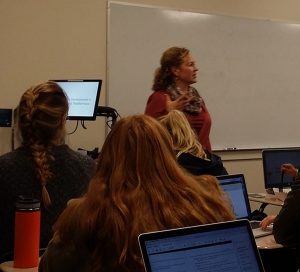
Professor Julie Derzay lectures on infant and toddler cognitive development.
The transition from high school to college can be stressful—new expectations, more opportunity for self-determination, and a different living situation. It’s no wonder parents occasionally flounder during this time. As momentous and stressful as this life change can be for parents, it is equally so for the new-fledged adults starting their first year of college. It can help to know what to expect.
So much is happening developmentally during this time, as students learn when they take NURS 210 in their sophomore year. Physiological and psychological developments are still occurring, concurrent with cognitive and intellectual development. Students are learning new content and learning new ways of thinking about life. They are away from parents and family, requiring them to seek social supports and interactions in a new realm.
The most important thing is to remember that you are starting all new, and its normal to be a little uncomfortable. These classes are hard, they move fast, and professors have a different way of teaching than high school teachers. Sometimes that can be stressful and frustrating. This all will pass! You will get really good at the balance of being an adult learner, you will build true friendships, and you will adapt to the environment of campus. You are not alone in this journey of firsts…every student feels this pressure, only for a while.
Faculty have a unique perspective from which to witness students’ transformation. Each freshman BSN student takes an introductory Nursing course their first semester (NURS 100); their instructor becomes their faculty advisor, providing guidance throughout all fours years of the student’s BSN program. Advisors help students form a progression plan (a detailed course of study listing what courses to take each semester).
Sample Schedule: Freshman Year First Semester
- ENGL 101 Writing and Persuasion
- MATH 121 (or BUSN 230) Intro to Statistics
- PHIL 101 Reading and Reasoning
- SOCI 101 Introduction to Sociology
- BIOL 105 Information Flow in Biological Systems
- NURS 100 Nursing Perspectives
Sample Schedule: Junior Year First Semester
- NURS 311 Professional and Therapeutic Communication
- NURS 314 Assessing and Promoting Wellness
- NURS 315 Practicum I: Healthy Individuals, Families, and Communities
- NURS 316 Pathophysiology and Pharmacology I
- PHIL 455 Medical Ethics
Gonzaga nursing students benefit from studying at a liberal arts university. Most freshman and sophomore classes are University Core requirements. The diversity in the core classes is a wonderful way for nursing students to connect to the campus as a whole and make friends they won’t see every day in every future class. Students should enjoy this time in campus-wide activities. Junior and senior year students are immersed in nursing classes, allowing them to gain proficiency in their field of study. New nursing students can connect with other Nursing majors by joining the Gonzaga Student Nurses Association (GNSA). The GNSA does service projects throughout the year.
Our professors enjoy teaching and advising first year nursing students. They embrace the opportunity to help a student gain understanding of their pathway and how to best be successful. Reflecting on the development she sees in students over four years, Professor Derzay shares, “Students learn to be organized and make good use of their time in the first year. In year two, they learn they are strong and determine what makes them most successful. Third year students (used to changes) are flexible, and resilient. Fourth year students are creative and engaged.”